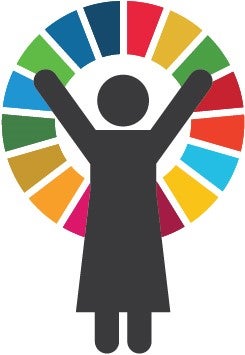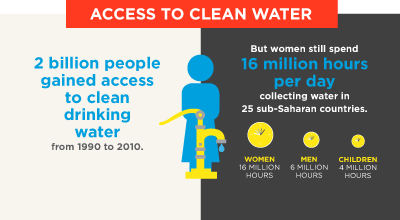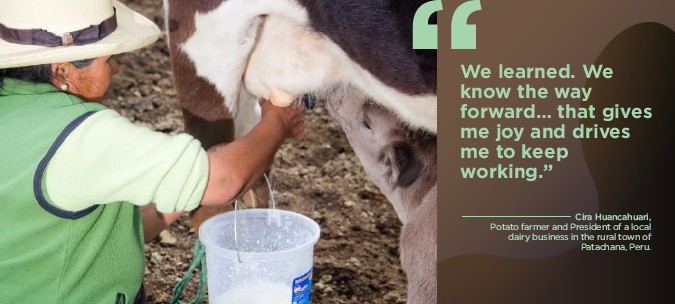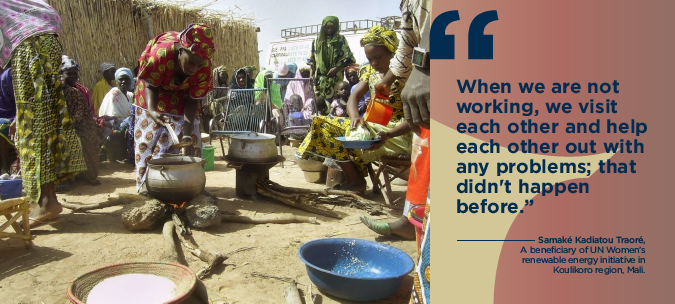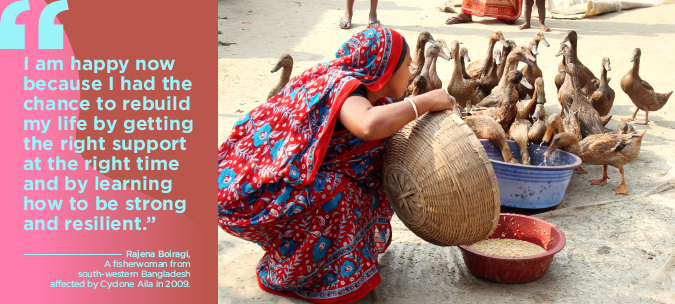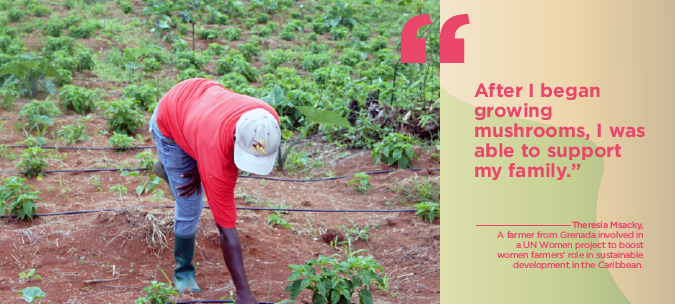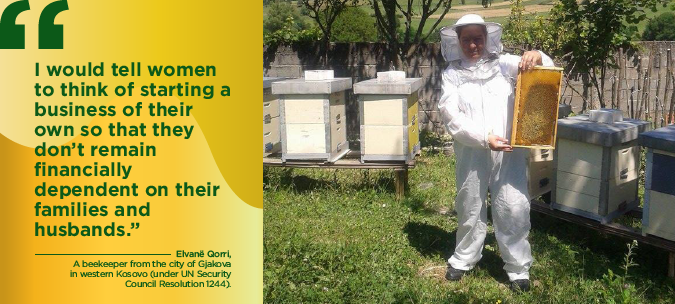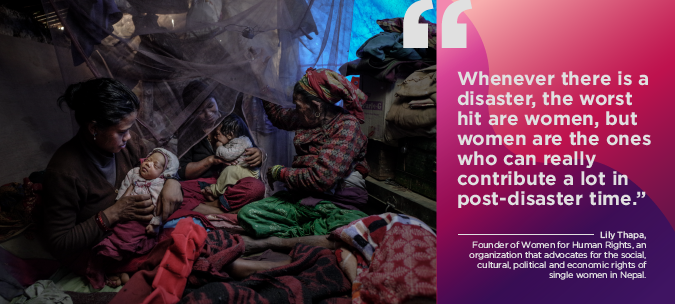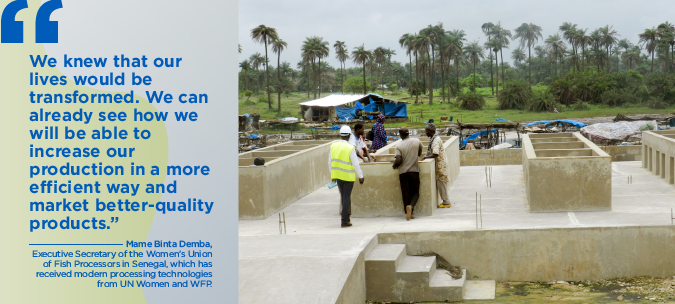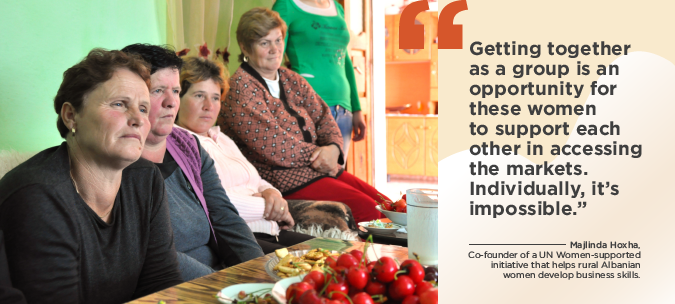Empowering rural women through the SDGs
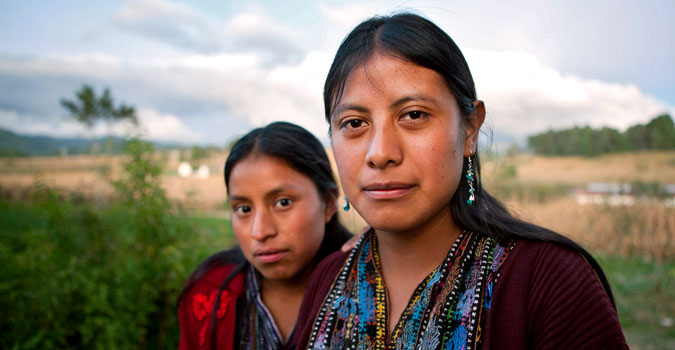
Messages |News and events | Stories of change |Join the conversation
This week, UN Women marks three UN observances that reflect women's key role in development, beginning with International Day for Rural Women on 15 October, World Food Day on 16 October and International Day for the Eradication of Poverty on 17 October.
These interconnected issues are more relevant than ever before, as the new Agenda 2030 for Sustainable Development has just been adopted by world leaders as the new global roadmap. Gender equality and women’s rights and empowerment are cross-cutting throughout the 2030 Agenda, with its 17 Sustainable Development Goals (SDGs). The Goals are intrinsically linked to the lives of women and girls globally, including that of rural women, who are vital to its success. Particularly the goal to end poverty in all its forms everywhere, the goal to end hunger, achieve food security and improved nutrition and promote sustainable agriculture as well as the goal to achieve gender equality and women’s empowerment.
Rural women are key agents for achieving the transformational economic, environmental and social changes required for sustainable development. But limited access to credit, health care and education are among the many challenges they face, which are further aggravated by the global food and economic crises and climate change. Ensuring their empowerment is key not only to the well-being of individuals, families and rural communities, but also to overall economic productivity, given women’s large presence in the agricultural workforce worldwide.
In numbers
- Rural women spend more time than urban women and men in domestic and household work. A study of the correlation between time and water poverty in 25 countries in sub-Saharan Africa estimated that women spend at least 16 million hours a day collecting drinking water; men spend 6 million hours; and children, 4 million hours [1].
- Women farmers control less land than do men, and also have limited access to inputs, seeds, credits, and extension services. Less than 20 per cent of landholders are women. Gender differences in access to land and credit affect the relative ability of female and male farmers and entrepreneurs to invest, operate to scale, and benefit from new economic opportunities [2].
- Maternal deaths disproportionately affect rural women. In the least developed countries, a rural woman is 38 per cent less likely than an urban women to give birth with the assistance of a skilled health professional [3].
- Key findings from a study by UN Women, the World Bank, and the Poverty and Environment Initiative indicate that the gender gap in agricultural productivity ranges from 4-40 per cent depending on the country and the food or cash crop in question, and could cost up to USD 100 million in Malawi, USD 65 million in Uganda, and USD 106 million in the United Republic of Tanzania.
Our work
UN Women supports the leadership and participation of rural women in shaping laws, strategies, policies and programmes on all issues that affect their lives, including improved food and nutrition security, and better rural livelihoods. Training equips them with skills to pursue new livelihoods and adapt technology to their needs. UN Women acts to end poverty through programmes to provide training, loans and practical skills to empower poor rural women economically, give them a voice, strengthen social services and increase awareness of women’s rights. The organization also works to ensure women’s access to basic services, control over land and other forms of property, inheritance, natural resources, appropriate new technology and financial services.
Messages

In her statement to mark this year’s International Day of Rural Women, UN Women Executive Director Phumzile Mlambo-Ngcuka says “we have an unparalleled opportunity and commitment to end poverty and hunger, achieve food and nutrition security, and guarantee sustainable livelihoods by investing in rural women and climate-resilient agriculture”. Read her full statement here »
Events
On 15 October 2015, to celebrate International Day of Rural Women, UN Women is organizing an event entitled “Rural Women’s Empowerment through the Sustainable Development Goals” from 13.15-14.30, at United Nations Headquarters, Conference Room 7. Read the concept note.
Stories of change
Hear from rural women around the world whose lives have changed as a result of these efforts:
The carpet weaver of Jdeidet El Fekha, Lebanon
The yogurt maker of Patachana, Peru
The medicinal plant farmer of Ghriss Essoufli, Morocco
The energy-efficient food producer of Koulikoro, Mali
The crab and shrimp collector of Holdibunia, Bangladesh
The water harvester of Guys Hill, Jamaica
The beekeeper of Gjakova, Kosovo (under UNSCRr 1244)
The earthquake-affected family in Dakshinkali, Nepal
The artisanal fish harvester of Casamance, Senegal
The fruit and herb farmer of Dibra, Albania
Join the conversation
Join the conversation around the International Day for Rural Women using the hashtag #ruralwomen and and follow @UN_Women on Twitter. A social media package with images and messages in English, Spanish and French is available here.
In observance of the International Day of Rural Women, UN Women’s EmpowerWomen.org, in collaboration with the Mara Foundation, will organize a Twitter Chat on Friday 16 October, from 9.30 – 10.30 a.m. EDT. The chat will focus on Rural Women’s Empowerment through the Sustainable Development Goals and rural women as powerful agents of change.
Notes
[1] UNDP (2012) Millennium Development Goals Report 2012, p. 54; World Health Organization and United Nations Children’s Fund (2012) Progress on Drinking Water and Sanitation: 2012 Update, as retrieved from Secretary General’s Report on the Improvement of the situation of women in rural areas (A/70/204).
[2] Food and Agriculture Organization (2011). The State of Food and Agriculture 2011: Women and Agriculture, Closing the Gender Gap for Development. Note that although global data is limited, there is evidence that supports this claim.
[3] UN Women, Progress of the World’s Women 2015-2016: Transforming economics, realizing rights (New York, 2015).
